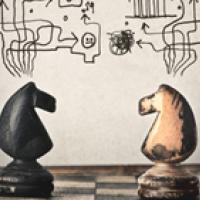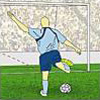
Celebrate pi day with game theory!
Every year on March 14 the world celebrates the beauty of maths. That's because when you write the date the American way — with the month coming first — you get 3/14. And 3, 1, and 4 are the first three digits of $\pi$, one of the most important numbers in maths.
To celebrate this year's pi day, we've decided to delve into the fascinating world of game theory. It's much more than what you might expect when you hear the word "game": the mathematical theory of games can shed a lot of light on the behaviour of humans and animals, on economics, and even on politics. Here are some of our favourite articles on the topic. And because there are quite a few of them, we've sorted them into three groups:
The basics
Maths in a minute: Why do mathematicians play games? — This brief introduction explains what game theory is all about and explores an eerily relevant example of how it can be applied to real life.

Maths in a minute: The prisoner's dilemma — Here's a quick look at the most famous mathematical game, which illustrates a paradox of life many of us will be familiar with.
Some actual games
Tic-tac-toe, the other way around! — Here's a gentle introduction to how you might think about a game in a mathematical way, using the example of reverse tic-tac-toe.
Play to win with Nim — In the game of Nim one player always has a winning strategy: it depends on an unusual way of adding numbers.
Bluffing and exploitation: An introduction to poker maths — Is poker a game of psychology and cunning rather than strategy? We investigate the maths of bluffing.
Mixing doubles — Mixed doubles are popular in tennis, but how do you make sure that the competing pair is the best you can pick from the team?

Blast it like Beckham — What tactics should a football player use when taking a penalty kick? And what can the goalkeeper do to foil his plans? Game theory helps out.
Games people play — Combinatorial game theory is a powerful tool for analysing mathematical games. We explain how the technique can be used to analyse games such as Twentyone and Nim, and even some chess endgames.
How to win at Mornington Crescent — This article casts a mathematical eye over a non-game you may be familiar with from BBC Radio 4.
Human (and animal) behaviour
Does it pay to be nice? — Game theory says it does, and we're not just talking about that warm fuzzy feeling inside. It pays in terms of genetic success too, and this explains the evolution of altruism.
Conform to the norm — Why do we wait patiently in queues instead of just elbowing in? Because we're hard-wired to follow social norms. Game theory explains why.
Can game theory help vaccinate the world? — There's an obvious moral reason for sharing COVID-19 vaccine doses around the world, but game theory suggests there's also a selfish reason why high-income countries shouldn't be hoarding them.

Game theory and the Cuban missile crisis — Sadly relevant today: how game theory can be used to analyse a nuclear stand-off.
Want less traffic? Build fewer roads! — It may sound strange, but a mathematical "paradox" explains why more roads don't necessarily mean fewer traffic jams.
Dividing the indivisible — Disputes over property are all too common. It's quite easy to share a cake, but how do you share out indivisible goods, such as houses or cars, without causing resentment? Here are two easy methods.
Love's a gamble — Gifts are an important part of courtship, even some species of animals know this. But what kind of gift should you offer? Game theory suggests an answer.

Adam Smith and the invisible hand — Adam Smith is often thought of as the father of modern economics. It was Smith who described the invisible hand mechanism by which he felt economic society operated. Modern game theory has much to add to Smith's description.
Game theory wins prizes
Elusive equilibria — The Rolf Nevanlinna Prize is awarded for outstanding contributions in mathematical aspects of information sciences. Here the 2018 winner explains why equilibrium may be unattainable and why it's good to be constructive.
Leaving the markets — The 2009 Nobel Prize in Economics went to two unusual economists and involved a whole lot of game theory.
2007 Nobel Prizes won by mathematicians — The 2007 Nobel Prize in Economics was awarded for work that used game theory to explore optimal funding mechanisms for financial markets.
Game theory wins Nobel prize — Finally, the 2005 Nobel Prize in Economics was also awarded for work using game theory, this time to explore conflict and cooperation..